- Home
- Sharyn McCrumb
Highland Laddie Gone Page 15
Highland Laddie Gone Read online
Page 15
Lightfoot nodded. “Everybody watches television these days. Okee-fine. But I don’t mind telling you that this case is downright peculiar. Fingerprints, no alibi, good obvious motive. That’s great for the beer-joint stabbings I have to contend with, but if M.D.s don’t have any more sense than that…”
Walter felt the same way. Not only was it a frame, it was an insult to his intelligence. It was so obvious that they might even make a jury see it. He didn’t much care, though. He was tired.
Lightfoot had pulled out a notepad and was about to launch into further arguments when the door to the outer office opened and Merle Fentress peeked around it. “Call for you, Sheriff,” he said in meaningful tones.
“Who?”
“Festival people again.”
“Now what?” asked Lightfoot, pushing back his chair.
“Another murder, they reckon.”
Lightfoot glanced at the prisoner, and then edged past the deputy into the office. “Damnit!” he muttered. “Never mind the battle reenactment. This case may outlast the war!”
Lightfoot eased the patrol car off the state highway and turned up the road to Glencoe Park. He felt a spasm of irritation as he drove past the posters announcing the Highland games, and then the Civil War reenactment. Damnit, there ought not to be more bodies the week before the battle than there were during it. He wondered if Dr. Hutcheson had disposed of this one about the same time as the first murder, or whether there was another killer at large. The coroner ought to be able to help with that one. Maybe his hunch was right, and the doctor had been framed: that was easier to swallow than the mass-murderer theory.
Lightfoot narrowed his eyes. What in blazes was wrong with that sports car up ahead of him? Other than its driving on the wrong side of the road. Oh, hellfire, thought Lightfoot, the drunks are getting in on the act. He flipped on his flasher and eased up toward the offending vehicle with catlike smoothness.
After a few seconds in which the two occupants seemed to confer, the car pulled over on the grass. Lightfoot slid his Dodge in behind them and made notes of the description and license plate. Having thus given the offenders time to stew about their predicament, he slid out of the patrol car and strolled toward the blue MG.
“Well, it has the bloody steering wheel on the correct side,” the driver was saying to his companion. “It was a perfectly natural-what did you say? Well, I’d like to see your performance under similar circumstances!”
“Step out of the car, please, sir,” purred Lightfoot in his official voice. His eyes widened when he recognized the driver of the sports car. “Well, hello, Scotty! Is this a spy car with cannons mounted on the fender?”
Cameron Dawson was annoyed. “Save it, Sheriff! I have spent a good hour nursemaiding this… this…”
Lightfoot peered in at the passenger. “Pretty far gone, isn’t he?”
“Yes, and he wanted to drive.”
The sheriff shook his head. “You reckon he could’a done much worse?”
“As I was trying to tell him: it was a perfectly natural mistake. In Britain we drive on the left side of the road, and this is a British car, so-”
“Yeah, but it’s an American road, doncha know,” Lightfoot drawled. “Can I see your license, please, Scotty?”
With a sigh of martyrdom, Cameron reached into his hip pocket and pulled out a clear plastic case. “British driving license,” he said in answer to the sheriff’s puzzled look.
Lightfoot took the document with a frown of suspicion. He pulled the work paper out of the plastic case, looked down the length of it and read a few lines, his lips moving. “Expires in… 2025! Do they mean the year?”
“That’s right.”
“That’s crazy. And there’s no picture of you on here, either. And most critical, it is not a Virginia driver’s license.”
“It’s good for thirty days in this country,” Cameron informed him.
“Yeah, I’d like to give you thirty days for it,” Lightfoot grunted. “And another sixty for reckless driving; but as it happens I have another murder to contend with, so I do not have time to deal with you. Why don’t I just follow you along into the park so you can’t do any more English things on the way? Then you can stick around while I investigate.”
“Sheriff, I’ve tried to explain to you that I am not-”
“Or I could write you up, and radio for someone to come and get you.”
Cameron’s lips tightened. “Right, Sheriff. I’ll meet you at the car park.”
The county rescue squad, already on duty for the festival, had cordoned off the area and were standing watch over the body when Lightfoot MacDonald and his British colleague arrived. They had covered Lachlan Forsyth’s body in a sheet, but the scene otherwise was just as they had found it.
Lightfoot squinted in the late-afternoon sun. The military practice should be breaking up by now. He had half a mind to give Blevins a call on the mobile phone, but he resisted the impulse. Twentieth-century business came first. The coroner should be on his way back, and wouldn’t he be a ray of sunshine after being hauled out twice in a day?
The sheriff knelt down and gently lifted the sheet. “Another stabbing,” he grunted. “Anybody know who this one belonged to?”
The rescue-squad leader, squatting on his heels near the Port-A-John, said, “That festival chairman seemed to think it was his.”
“His?”
“Sorry. Belonged to the deceased himself, I aimed to say.”
Lightfoot looked up at Cameron Dawson. “You know anything about this?”
“Just the identity. That was Lachlan Forsyth. He was a Scot,” said Cameron quietly.
“Damn! Not your spies again?”
“He was the organizer of the-the fraud, I guess you’d call it. I don’t see why anyone would have killed him for it. Unless they were annoyed at having been taken in. He got a lot of money out of them, I suppose.”
Lightfoot slid the sheet back into place. He had been a distinguished-looking old fellow; that kind makes the best con man, he thought sardonically. He didn’t like the idea of a murder unrelated to the first one-because this was an unlikely convention spot for killers-but life didn’t always follow the rules of good taste or common sense, so Lightfoot was keeping an open mind. He turned back to the rescue-squad leader. “My people will be along directly to take over. Meanwhile, keep everybody away from here. I’m going to talk to folks, starting with the lucky so-and-so who found the body. Have somebody notify me when the coroner arrives.”
James Stuart McGowan had been assigning tartans and dispensing plaid woolens with the authority of the Lord Lyon of Scodand. It was very easy, once you got the hang of it. He had already made enough money to buy two skian dubhs, if you counted the markup he was pocketing; he thought about slipping that money back into the till. If Lachlan found out how solvent he was, it would either cause awkward questions, or he would sell him the dagger and cancel the apprenticeship. If he took the money with him, and Babs and Stewie found it, things could get even stickier. They would assume that he was dealing drugs and ship him off to a shrink with an earth-tone office.
He supposed that he had earned the money, really. He had spent half the time running the stall alone. Lachlan was taking some break this time. It must have been three hours, and Jimmy-who hadn’t eaten since lunch-was beginning to miss him. He helped himself to another Penguin bar from the food section. He wondered if he could find an elderly lady both sympathetic and dumb enough to bring him a shandy from the refreshment tent.
The Maid of the Cat was approaching the stall. He smiled thinking of the way he had conned her into buying a scarf. It ought not to be too hard to get a shandy out of her, he decided. But what was she looking so grim about?
“Hello,” he said, tossing the foil candy wrapper into the trash bag. “What can I sell you this time?”
Elizabeth didn’t smile back. “What’s your name?” she asked gently.
“Jimmy,” he said warily, not liking her tone.
“Perhaps. My grandmother doesn’t confide in me.”
Her sympathetic look turned to exasperation, which Jimmy found much easier to abide. “Now what’s this all about?”
She hesitated. “Are your parents around, dear?”
He shrugged. “Someplace. They don’t count, though. You’d better talk to me. What is it about Lachlan? Something about those clowns he was always whispering with?”
Elizabeth sighed. Even under the pressure of a double murder, she thought someone more official than she should have been delegated to tell the little boy. “I’m sorry,” she said. “He’s been killed. They found him a little while ago.”
Jimmy stared at her. She was watching him anxiously as if she expected him to start howling. People never seemed to know much about kids; something must happen to your memory when you passed thirteen. He’d often wondered about it. Now, what was it that he was avoiding thinking about that made him consider all that? Oh, yes. Lachlan was dead.
“How?” he asked, in the tones of one seeking information.
“Just like the first victim, I’m afraid.”
“Stabbed with a skian dubh.”
“Yes. Oh, but you mustn’t think about it. I’m sure your parents-”
Jimmy looked in the glass case. He’d been too busy all morning to notice. The skian dubh was gone. The old man must have taken it with him. For protection, of course. He’d never have it now, which absolved him from asking himself if he could possibly want it.
The girl was still droning on. Something about locating his “Mommy and Daddy.” As Jimmy pushed past her out of the stall, heading at a dead run for the woods, he yelled back at her, “Just sod off!”
That phrase-his only legacy from Lachlan Forsyth.
From the outside table in the refreshment tent, Elizabeth could keep an eye on the path to the parking lot. Cameron should be coming back anytime now. She hoped she hadn’t missed him when she went to talk to the little boy; but when she realized that everyone had overlooked him, she didn’t feel that she had any choice. She leaned down and offered the rest of her sausage roll to Cluny, who took it with the air of performing a favor. Really, she had to stop eating this British pastry before she started receiving offers to play lineman for Green Bay.
“Hello,” said Marge Hutcheson, edging her way through the crowd with a cup of coffee in her hand. “Mind if I join you?”
“Hello, Marge,” said Elizabeth. “I was thinking about coming to look for you. I guess you’ve heard what happened.”
“To Lachlan Forsyth? Yes. Too bad, wasn’t it?”
“I suppose it clears Walter?”
“I expect so. Depends on when he was killed, don’t you think? So you never got to question him.”
Elizabeth sighed. “No. I probably wouldn’t have been able to come up with the right questions anyway.”
Marge patted her hand. “Don’t sell yourself short,” she said kindly. “The murderer will probably turn out to be someone we’ve never even heard of. Somebody crazy, perhaps. Why don’t you forget all about the case, and get things straight with that sexy Scot of yours?”
Sexy! It’s amazing how my brain is turning to mush, Elizabeth thought. Instead of wanting to reconsider the murder case, the first thing I think of is whether I would quibble with that adjective. The sexiest thing about Cameron is that he doesn’t seem aware of it at all. I practically had to drag him…
She interrupted this pleasant reverie when she noticed someone looming over the table. “Hello, Geoffrey. What do you want?”
Geoffrey sighed. “Oddly enough, I want the damned cat. I was just walking around in the woods, turning over a few ideas for set design in my head, when I hear the damnedest noise from some rocks. Rather like a hiccoughing ferret.”
“Oh, dear,” said Elizabeth, who had learned to ignore Geoffrey’s powers of description. “Was it a little boy?”
“Yes. An odious child who has been manning a souvenir stall. But he seems quite distressed. I gather he’s grieving for one of the murder victims, which is a refreshing novelty.”
Elizabeth winced. “Yes. His name is Jimmy. But why do you want the bobcat?”
“Because I want to take his mind off his troubles. It will do him good to have another soulless creature under his charge, and you don’t want the cat anymore, surely, since you have other prey to stalk. Correct?”
Elizabeth handed over the leash. “Make sure he takes good care of Cluny!” she warned. “Bobcats can be dangerous animals.”
“So can ten-year-old boys,” Geoffrey assured her.
As they watched him move away, gingerly leading the Chattan mascot, Marge remarked, “You know, sometimes I think that cousin of yours is almost human.”
“Almost,” Elizabeth agreed.
CHAPTER THIRTEEN
ELIZABETH caught her breath. Here goes, she thought. Cameron Dawson and Sheriff MacDonald were walking back together on the path that led to the parking area. She wanted to see him so badly. She wished he were in China. She wanted to run and hold him, right in front of everybody. She was scared to death of him. And mostly, she kept forgetting to breathe.
Before she could make up her mind to lose herself in the crowd at the counter, he had caught sight of her and waved, smiling. Elizabeth waved back, feeling the hot flush in her cheeks. Damn you, anyway, Cameron, she thought. You’re like a bloody baby giraffe: you’re trampling me and you don’t even know it.
Bloody! Even the words were his.
He had said something to the sheriff-who had gone into the hospitality tent-and now he was coming toward her as innocently as a falling cable car. I love you so much, she thought; please get the hell away from me. I don’t want to live through the next five minutes, and you’re damn sure not going to enjoy it either, kid.
He still had about twenty yards to traverse, during which time she tried psyching herself into indifference. Sometimes he hardly even knows I’m there, she told herself; he talks to me-at me-as if he were cleaning out his mind. And when I try to tell him things, he replies with something so off-the-wall that he can’t have been listening. I wonder if he even takes women seriously. I might as well be a seal, sometimes.
This line of reasoning might have worked if it had not been overlaid with a ton of subjectivity, all in the offendder’s favor. The part of Elizabeth’s mind reserved for the defense replied with a soft-focus video memory of the night before, accompanied by a sound track of a country song: “Loving you feels just like coming home.”
Oh, well, she thought, when my level of reasoning is reduced to quoting country music, I might as well throw myself in front of a Mack truck. A MacTruck, she thought ruefully. And here it comes.
Cameron Dawson, still a bit edgy from having to suffer fools gladly for the last hour or so, was blissfully unaware that he personified disaster. “Hello,” he said, still smiling. “I nearly got myself thrown in jail just now. I tried to do a good deed, mind you, and keep a bloody drunk off the road by giving him a lift, and that sheriff wanted to put me away.”
“I expect you were on the brew yourself,” Elizabeth replied, remembering Heather’s phrase.
Cameron blinked. “What? No, I don’t think so. Dr. Campbell is dead, so I expect I’ll be allowed to go ahead with my seal research.”
“What does that have to do with drinking?”
“We weren’t talking about drinking,” Cameron pointed out. “ ‘On the brew’ means unemployed.”
Elizabeth shrugged. Heather couldn’t have meant it that way. British nobles did not have unemployed fathers. (Did they?) Apparently the nobles had their own version of slang. She was too polite to mention this to Cameron, though.
“I’ve just been up with the sheriff, looking at poor Mr. Forsyth. He was a very nice fellow; it’s a great pity.” He looked at her. “Is that sort of thing usual in this country?”
“Two murders a day?” murmured Elizabeth. “Not usually in one�
�s immediate vicinity.” She did not offer any further topics of conversation, which was most unusual for Elizabeth, who often talked to avoid having to communicate.
“Is anything wrong?” asked Cameron finally.
“We need to talk,” Elizabeth said quietly.
Oh shit, thought Cameron. He may have only been in the States for a matter of hours, but cultural gap or no, when a woman says, “We have to talk,” there’s a storm brewing. “Okay,” he said pleasantly. “Want to walk a bit while we’re doing it?”
Elizabeth nodded. In the direction of a cliff, she thought. “It isn’t really very important,” she murmured when they were out of the festival crowd. “Just something I thought I probably ought to ask you.”
Cameron was silent for a moment, and his ears had turned noticeably redder. “Fire away, ma’am,” he said, still as calm as ever. It isn’t very important was another danger sign.
Elizabeth looked at the soft green mountains couching the sky like so many overstuffed sofas. Appalachian mountains, she thought: you can’t see them for the trees. And we are just like them: everything is soft and covered up by layers of politeness and caution. I couldn’t say anything straight out if my life depended on it. She wondered what the mountains were like in Scotland.
“I realize that last night probably didn’t mean anything,” she began slowly.
Cameron didn’t look at her. “I don’t know,” he said carefully. “It did to me.”
“Well, I just wanted you to know that you don’t have to keep spending time with me if you don’t want to. If you’d rather be with somebody else, I’ll understand.”
“Someone else? I’ve spent the last two hours with a drunk and a sheriff who thinks I’m a spy. Is that your idea of competition?”
“No. I thought there was someone else here that you might want to be with. And I guess she needs you more than I do, now that her husband-”
Cameron thought it all through very carefully. She and husband and Elizabeth’s look of moist-eyed nobility. He took a wild guess. “Are you talking about Heather?”

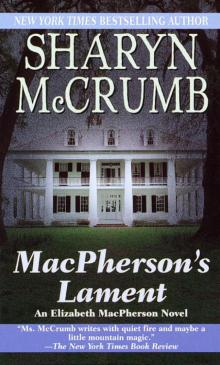 Elizabeth MacPherson 07 - MacPherson’s Lament
Elizabeth MacPherson 07 - MacPherson’s Lament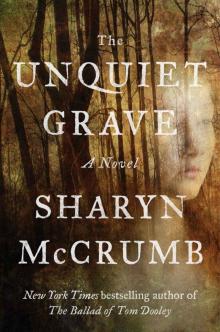 The Unquiet Grave: A Novel
The Unquiet Grave: A Novel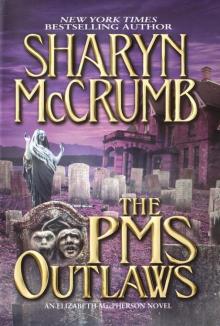 The PMS Outlaws: An Elizabeth MacPherson Novel
The PMS Outlaws: An Elizabeth MacPherson Novel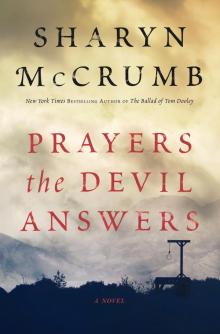 Prayers the Devil Answers
Prayers the Devil Answers Paying the Piper
Paying the Piper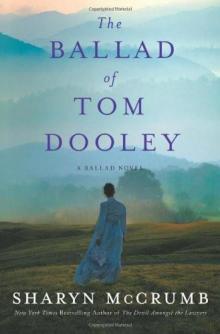 The Ballad of Tom Dooley: A Ballad Novel
The Ballad of Tom Dooley: A Ballad Novel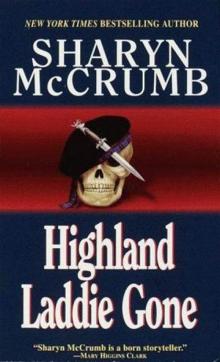 Highland Laddie Gone
Highland Laddie Gone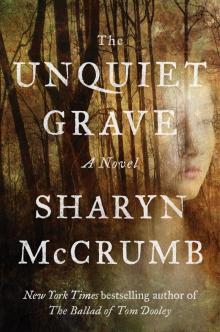 The Unquiet Grave
The Unquiet Grave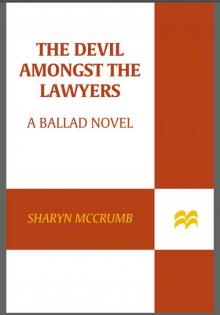 The Devil Amongst the Lawyers
The Devil Amongst the Lawyers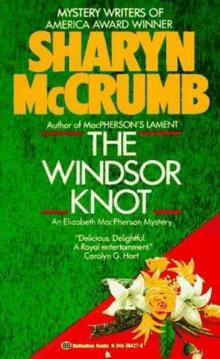 The Windsor Knot
The Windsor Knot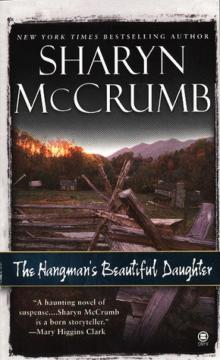 The Hangman's Beautiful Daughter
The Hangman's Beautiful Daughter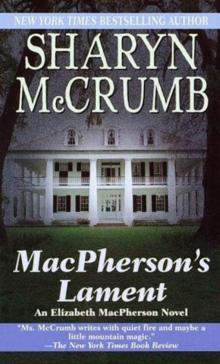 MacPherson's Lament
MacPherson's Lament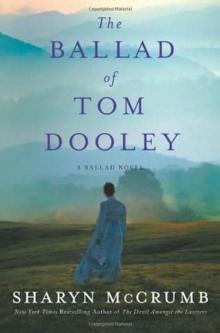 The Ballad of Tom Dooley
The Ballad of Tom Dooley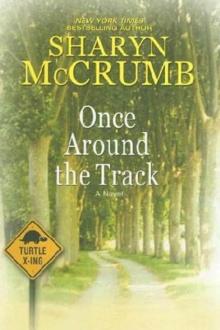 Once Around the Track
Once Around the Track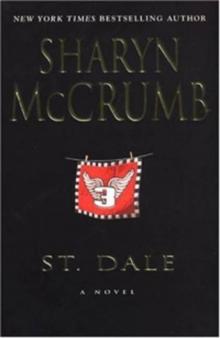 St. Dale
St. Dale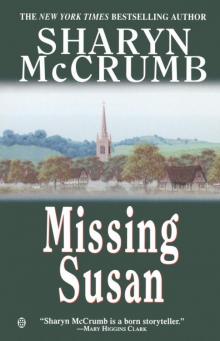 Elizabeth MacPherson 06 - Missing Susan
Elizabeth MacPherson 06 - Missing Susan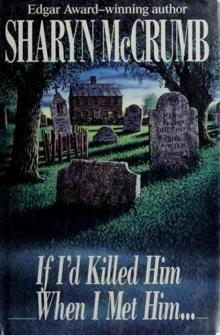 If I'd Killed Him When I Met Him…
If I'd Killed Him When I Met Him…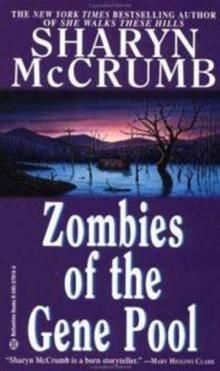 Zombies of the Gene Pool
Zombies of the Gene Pool Bimbos of the Death Sun
Bimbos of the Death Sun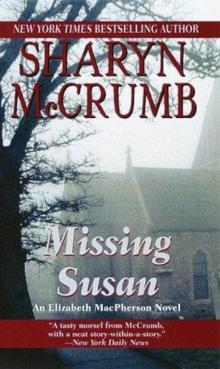 Missing Susan
Missing Susan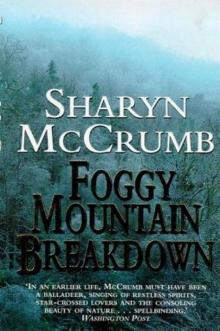 Foggy Mountain Breakdown and Other Stories
Foggy Mountain Breakdown and Other Stories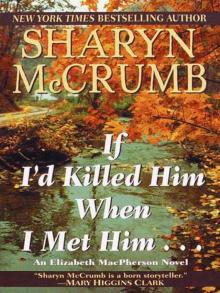 If I'd Killed Him When I Met Him
If I'd Killed Him When I Met Him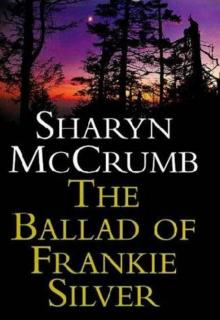 The Ballad of Frankie Silver
The Ballad of Frankie Silver Lovely In Her Bones
Lovely In Her Bones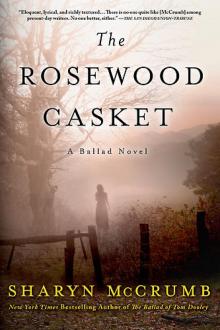 The Rosewood Casket
The Rosewood Casket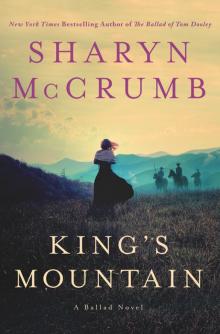 King's Mountain
King's Mountain